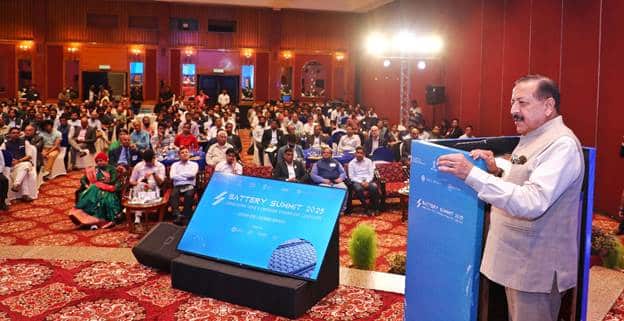A robust ecosystem will support India’s goal of becoming the world’s third-largest economy

Union Minister of State for Science and Technology, Dr. Jitendra Singh, recently addressed the Battery Summit 2025, highlighting the importance of low carbon technologies in propelling India to become the world’s third-largest economy. He emphasized that a robust ecosystem for battery innovation is crucial for achieving India’s ambitious Net Zero target by 2070. The summit also marked the launch of the Battery Aadhaar Initiative, aimed at enhancing traceability and efficiency within India’s battery sector.
Advancing Low Carbon Technologies
During his speech, Dr. Singh focused on the theme “Addressing Challenges, Driving Innovation and Scaling Solutions.” He underscored the need to explore untapped reserves and innovate within low carbon energy sectors to drive economic growth and minimize carbon emissions. This aligns with India’s commitment to achieving Net Zero by 2070. The Minister specifically mentioned the recent discovery of significant lithium reserves in Jammu and Kashmir, which could play a vital role in meeting these environmental goals. He called for intensified efforts to harness such underutilized resources, which could contribute significantly to India’s clean energy transition.
Dr. Singh noted that the Department of Science and Technology (DST) is pivotal in advancing clean energy initiatives. The department is working on innovations in battery manufacturing, electric mobility, and sustainable technology ecosystems. These efforts are essential for reducing India’s carbon footprint while promoting economic development.
Launch of the Battery Aadhaar Initiative
A significant highlight of the summit was the introduction of the Battery Aadhaar Initiative, which Dr. Singh described as a “game changer” for India’s battery ecosystem. This initiative aims to assign a unique digital identity to each battery pack, allowing for comprehensive tracking of manufacturing origins, battery chemistry, safety certifications, and lifecycle performance. The system will monitor critical parameters such as thermal events and charge-discharge cycles, facilitating predictive maintenance and efficient recycling.
Moreover, Battery Aadhaar will serve as a regulatory tool to combat counterfeit products, thereby enhancing consumer confidence. By integrating with Battery Management Systems (BMS) and national electric vehicle databases, this initiative is poised to become a cornerstone of India’s emerging battery intelligence ecosystem, supporting the country’s transition to sustainable energy solutions.
Strengthening India’s Clean Energy Transition
Dr. Singh highlighted several initiatives that are driving India’s clean energy transition, including the Production Linked Incentive (PLI) Schemes for Advanced Chemistry Cells and the E-Mobility Transition. He also mentioned flagship programs like PM-eDrive and the Faster Adoption and Manufacturing of Electric Vehicles (FAME) Schemes. The Dedicated MAHA-EV Mission under the Anusandhan National Research Foundation (ANRF) was noted as a crucial step in strengthening the electric vehicle ecosystem and promoting sustainable transportation.
Reflecting on India’s journey in climate negotiations, Dr. Singh pointed out the transformation from being a reluctant participant to a global leader in climate commitments. He attributed this shift to initiatives such as Net Zero 2070 and the International Solar Alliance, which underscore India’s leadership in promoting solar energy and global clean energy partnerships.
Fostering Innovation and Collaboration
Dr. Singh also emphasized the remarkable progress India has made in science and innovation over the past decade. The country has improved its position in the Global Innovation Index, moving from 81st to 39th place. Additionally, India’s startup ecosystem has expanded significantly, growing from 350 startups in 2014 to over 170,000 in 2025, making it the third-largest in the world. The DST’s budget has also seen a substantial increase, reflecting the government’s commitment to fostering innovation and research.
The Minister outlined three key priorities for sustaining India’s momentum in science and clean energy innovation: indigenizing technology to reduce import dependence, boosting domestic manufacturing to create resilient supply chains, and fostering collaboration between academia, industry, and government to drive transformative research.
Dr. Singh acknowledged the contributions of various organizations, including WRI India, UNEP, and NITI Aayog, in promoting sustainable practices. The summit brought together key dignitaries who are instrumental in advancing India’s science, technology, and sustainability agenda, underscoring a collaborative commitment to accelerating clean energy innovation.
Observer Voice is the one stop site for National, International news, Sports, Editor’s Choice, Art/culture contents, Quotes and much more. We also cover historical contents. Historical contents includes World History, Indian History, and what happened today. The website also covers Entertainment across the India and World.

